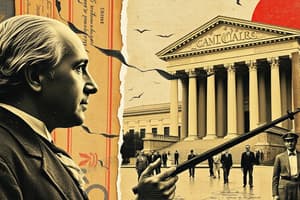Podcast
Questions and Answers
William Marbury was appointed a Justice of the Peace in the District of Columbia by President John ______.
William Marbury was appointed a Justice of the Peace in the District of Columbia by President John ______.
Adams
Thomas Jefferson's Secretary of State, James ______, refused to deliver Marbury's commission.
Thomas Jefferson's Secretary of State, James ______, refused to deliver Marbury's commission.
Madison
Marbury argued that he had a legal right to the commission under the ______ Act of 1789.
Marbury argued that he had a legal right to the commission under the ______ Act of 1789.
Judiciary
Madison claimed that the Judiciary Act of 1789 was ______.
Madison claimed that the Judiciary Act of 1789 was ______.
The Supreme Court was led by Chief Justice John ______ during the ruling.
The Supreme Court was led by Chief Justice John ______ during the ruling.
The Court declared the Judiciary Act of 1789 unconstitutional with respect to granting the Supreme Court original ______.
The Court declared the Judiciary Act of 1789 unconstitutional with respect to granting the Supreme Court original ______.
The ruling established the principle of judicial ______.
The ruling established the principle of judicial ______.
Marbury v. Madison established the Supreme Court as the final ______ of the meaning of the Constitution.
Marbury v. Madison established the Supreme Court as the final ______ of the meaning of the Constitution.
The ruling significantly ______ the power of the judiciary compared to the other branches of government.
The ruling significantly ______ the power of the judiciary compared to the other branches of government.
Marbury v. Madison continues to be cited in legal scholarship and American political ______.
Marbury v. Madison continues to be cited in legal scholarship and American political ______.
Flashcards
Judicial Review
Judicial Review
The power of the judiciary to declare laws or actions of the other branches of government unconstitutional.
Marbury v. Madison
Marbury v. Madison
A landmark Supreme Court case that established the principle of judicial review.
Commission
Commission
The right to hold a specific government office.
Original Jurisdiction
Original Jurisdiction
Signup and view all the flashcards
Judiciary
Judiciary
Signup and view all the flashcards
Executive Branch
Executive Branch
Signup and view all the flashcards
Legislative Branch
Legislative Branch
Signup and view all the flashcards
The Constitution
The Constitution
Signup and view all the flashcards
Appeal
Appeal
Signup and view all the flashcards
Judiciary Act of 1789
Judiciary Act of 1789
Signup and view all the flashcards
Study Notes
Background of the Case
- William Marbury was appointed a Justice of the Peace in the District of Columbia by President John Adams in the final days of his presidency.
- His commission was not delivered before Thomas Jefferson took office.
- Jefferson's Secretary of State, James Madison, refused to deliver the commission, preventing Marbury from taking his appointed position.
Marbury's Argument
- Marbury argued he had a legal right to the commission.
- He asserted the Judiciary Act of 1789 provided a legal path to obtain it.
- He claimed Madison violated his rights by withholding the commission.
Madison's Defense
- Madison argued the Secretary of State wasn't obligated to deliver commissions.
- He contended the Judiciary Act of 1789 was unconstitutional.
- Madison argued the Act gave the Supreme Court powers exceeding its constitutional authority.
The Supreme Court's Ruling
- The Supreme Court, led by Chief Justice John Marshall, acknowledged Marbury's right to the commission.
- However, the Court lacked the power to force Madison to deliver the commission.
Key Decision
- The Court declared the Judiciary Act of 1789 unconstitutional in its grant of original jurisdiction to the Supreme Court in Marbury's case.
- The Constitution, the Court reasoned, defined the Supreme Court's original jurisdiction, not Congress.
Significance of Marbury v. Madison
- The ruling established the principle of judicial review.
- Judicial review empowers the Supreme Court to invalidate laws or executive actions deemed unconstitutional.
- This strengthened the judiciary, making it equal to the other branches of government.
- The Supreme Court became the final interpreter of the Constitution.
Impact and Lasting Significance
- Marbury v. Madison profoundly shaped American constitutional law.
- It set a precedent for resolving conflicts among branches of government.
- The case's principles continue to be studied and debated.
- The concept of judicial review is an integral part of the American legal system.
Studying That Suits You
Use AI to generate personalized quizzes and flashcards to suit your learning preferences.




